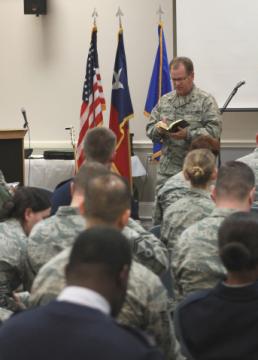Posted: November 25, 2015
 Courtesy Photo
Courtesy Photo
Chaplain Brig. Gen. Steve Chisolm, Air National Guard Assistant to the U.S. Air Force Chief of Chaplains, preaches to Texas Air National Guardsmen and their families during a chapel service held at the 136th Airlift Wing headquarters, Nov. 15, 2015, Naval Air Station Joint Reserve Base Fort Worth, Texas. Chisolm began his career as an Air Force chaplain at the 136th Airlift Wing where he helped build one of the largest chapel programs in the Air National Guard. (U.S. Air National Guard photo by Senior Airman Seth Holderby/Released)
NAVAL AIR STATION JOINT RESERVE BASE FORT WORTH, Texas – Chaplain Brig. Gen. Steve Chisolm, Air National Guard assistant to the U.S. Air Force Chief of Chaplains, led a packed room of Texas Guardsmen from the 136th Airlift Wing, during a service, Nov. 15, 2015, at Naval Air Station Joint Reserve Base Fort Worth.
For Chisolm, this visit was a chance to spend time with a program he helped build and the airmen he served.
“Then-Lieutenant Colonel Chisolm was my mentor. He influenced me even before I became a chaplain,” said Chaplain Capt. Nathan Tucker, 136th Maintenance Squadron, 136th Airlift Wing, remembering how Chisolm inspired him to become a chaplain. “He has never lost touch with me since the first time we met.”
During his service in the wing, Chisolm mentored chaplains like Tucker and devoted his efforts to building a support network where airmen could maintain their spiritual fitness.
“I think with almost 15 years of continual deployments, constant war has worn on all of us, from all the different components, physically, emotionally, but certainly spiritually,” said Chisolm. “You think about comprehensive airmen fitness and about those four components, the spiritual aspect is just as important, more important in my opinion.”
It was this vision that inspired the program so many service members in the wing know today.
“We have an excellent chaplain program,” said Staff Sgt. Patricia Johnson, noncommissioned officer in charge of chaplain operations and chaplain’s assistant to the wing chaplain. “It’s growing. When I came to this wing about six years ago, we had single digits numbers.”
The growth in the program Chisholm helped start was obvious, as more than 100 airmen packed the chapel for service.
“He laid the foundation to build the program,” said Tucker. “He built it through three things – trust with the leadership, being a man of integrity and understanding pastoral care.”
The chaplains’ program offers service members a time to set aside during drill to focus on their spiritual fitness. Because of the trust Chisholm built with wing leadership, wing chaplains have been able to work closely with unit commanders to ensure guardsmen have the option to attend chapel services with minimal effects on unit training.
“Seeing how it evolved to this, it is really refreshing to my soul,” said Johnson. “I know it’s making a difference in the members’ lives.”
Military chaplains are charged with the responsibility to provide spiritual care and the opportunity for service members, their families and other authorized personnel to practice their faith through religious observances, providing pastoral care and advising leadership on spiritual, ethical, moral, morale, core values and religious accommodation issues.
“My job as a chaplain is to provide for the free exercise of religion, as provided by the founding document,” said Tucker.
Placing spiritual fitness and pastoral care first, Chisolm honed a program that appears to do just that.
“Our members feel like we really do care about them, not just their personal growth or professional growth, but their spiritual growth as well,” said Johnson. “It helps them and their productivity. It helps enhance the mission.”
Chisolm continues mentoring others in his job at the Pentagon, serving as the liaison between the director of the Air National Guard and Headquarters United States Air Force Chief of Chaplains to ensure that the Air National Guard is providing airmen needs, as well as, making sure the Air force understands the needs of the Air National Guard.
Once in a while, Chisolm is able to make a guest appearance at units within Texas to provide spiritual guidance.
“Thank you for letting me do something that I haven’t gotten to do in years,” said Chisolm. “Preach here in this room.”
Coming back to the wing, Chisolm was able to see his vision for the unit’s chaplaincy program fulfilled.
“This chapel is successful because Chaplain Chisolm wanted to have the best program in the National Guard,” said Tucker. “And he succeeded.”
U.S. Air National Guard Seth Holderby and U.S. Army National Guard Staff Sgt. William Gasch, Sgt. Jason Robertson, Sgt. Angela Melton, Sgt. Hector Valladares contributed to this article.